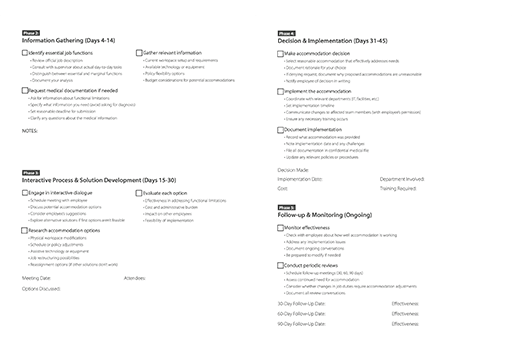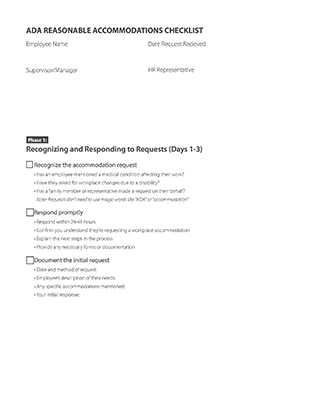ADA Accommodation Guide: Free Checklist for Employers
Managing ADA accommodation requests shouldn’t keep you up at night, but let’s be honest, it often does. With 44.1 million adults in the United States having a disability, you’re going to encounter these situations. The question isn’t whether you’ll need to handle accommodation requests, but whether you’ll be ready when they come up.
Too many organizations treat accommodation requests like legal emergencies, scrambling to figure out what they’re supposed to do while worrying about lawsuits. But here’s what experienced HR professionals know: when you have a clear process, accommodation requests become manageable conversations about solving workplace problems.
Whether you’re fielding your first accommodation request or you’re a seasoned HR professional looking to improve your process, this checklist will help you navigate each step without missing anything important.
What Is a Reasonable Accommodations Checklist?
A reasonable accommodations checklist is essentially your step-by-step guide for handling ADA accommodation requests without missing crucial steps or creating legal problems. Instead of wondering “What am I supposed to do next?” you have a clear path forward at each stage.
The checklist covers the entire process, from the moment someone mentions they need workplace changes due to a disability through implementing solutions and checking back to make sure everything’s working. It’s designed to protect both your organization and your employees by ensuring you handle everything consistently and legally.
What makes a good checklist different from just knowing the ADA requirements? It transforms abstract legal obligations into concrete actions. Instead of “engage in the interactive process,” you get specific steps like “schedule a meeting within one week” and “document the conversation afterward.”
Why is it Important to Use an ADA Accommodations Checklist?
Here’s the reality: accommodation requests involve multiple steps, tight deadlines, and serious legal implications. Miss something important or handle it wrong, and you could be looking at discrimination lawsuits, EEOC complaints, or worse — employees who feel unsupported and unwelcome.
You Need Legal Protection: The ADA requires employers to engage in an “interactive process” with employees requesting accommodations. This isn’t a suggestion: it’s a legal requirement that courts take seriously. When accommodation decisions get challenged, judges often look at whether employers followed proper procedures and documented their decision-making. A checklist helps you demonstrate that you did everything right.
Consistency Matters: Without a structured approach, different managers handle similar requests in completely different ways. One supervisor might bend over backward to help, while another barely does the minimum. This inconsistency creates legal liability and employee relations headaches. When everyone follows the same process, you eliminate these problems.
Timing Is Everything: ADA accommodation requests often come with time pressure. You need to respond quickly, gather information efficiently, and implement solutions without unnecessary delays. A checklist helps you stay on track and meet deadlines instead of letting things drag on.
Better Solutions Come from Better Processes: When you follow a structured approach, you’re more likely to find creative solutions that work for everyone. The interactive process is supposed to be collaborative problem-solving, not a legal checklist exercise. A good process keeps you focused on finding answers rather than just covering your bases.
Documentation Saves You Later: If an accommodation request ever leads to legal action, your documentation will be crucial evidence. A checklist ensures you’re collecting and preserving the right information at each step. You’ll be glad you have detailed records if you ever need them.
The cost of getting this wrong can be substantial. Beyond the obvious legal and financial risks, failing to handle accommodations properly means you’re not getting the most from your talent and may be pushing away valuable employees who just need a little support to excel.
Who Should Use the ADA Accommodations Checklist?
HR professionals typically coordinate the accommodation process, but you don’t have to be in HR to benefit from understanding these steps. If you’re managing the process, this checklist will help you stay organized and compliant.
Managers and supervisors often receive accommodation requests first, even if HR takes over later. Understanding the process helps you respond appropriately and avoid common mistakes that can create problems down the road.
Small business owners who handle their own HR need this information just as much as large corporations. You might not have a dedicated HR department, but you still have the same legal obligations.
Anyone involved in hiring, employee relations, or workplace management should understand how accommodation requests work. Even if you’re not directly responsible for the process, knowing what’s supposed to happen helps you support employees and colleagues more effectively.
The accommodation process works best when everyone understands their role and responsibilities. When managers know how to recognize requests and HR knows how to handle them, employees get better support and organizations stay out of legal trouble.
What’s Inside the ADA Accommodations Checklist?
Our checklist breaks down the accommodation process into manageable phases, each with specific actions and timelines. Instead of trying to remember everything you’re supposed to do, you can focus on the current phase and move through the process systematically.










